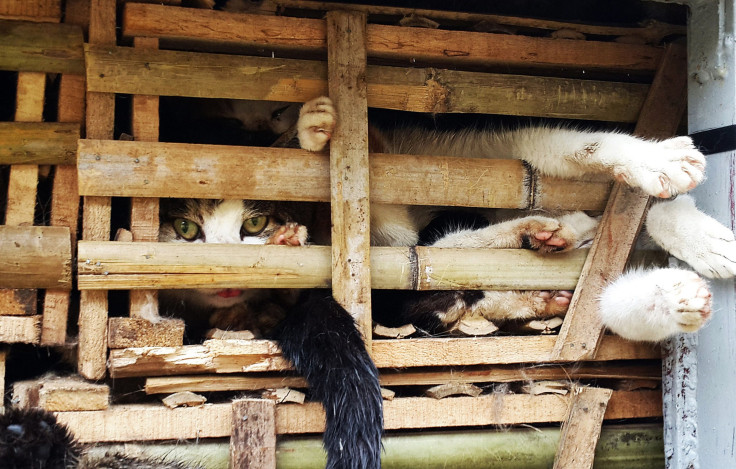Vietnam Seizes Thousands Of Cats Smuggled From China For Consumption

Police in Hanoi saved thousands of cats from potentially becoming barbecue after seizing a truck in Northern Vietnam carrying more than 3 tons of live cats smuggled in from China. While the cats will have to be culled in accordance with local laws, officers on Thursday indicated reservations about saving the cats bound for restaurants, only to have to kill them anyway.
"After receiving a tip, we searched the truck and discovered the cats inside," Cao Van Loc, deputy chief of police in Hanoi's Dong Da district, told German press agency dpa on Wednesday. "The owner, also the driver, said he bought the cats at the border area of Quang Ninh province," Loc said, adding that all of the cats were from China.
Photos and videos from the local An Ninh Thu Do newspaper showed the cats crammed into wooden crates with their limbs and tails sticking out. Loc told dpa that local laws dictate smuggled goods – that includes the cats – have to be destroyed. But the next day he told Agence France-Presse that they were undecided on killing the cats because there were so many. Loc said the driver will be fined around $350 for transporting goods without the correct documents.
The smuggling of cats from China into Vietnam is on the rise, according to local media reports, as cat meat has grown in popularity in recent years. Known locally as “little tiger,” cat meat is usually fried or barbecued, and served with rice wine at festive occasions or eaten as a snack in Northern Vietnam. Cat meat is seen as a delicacy and is typically eaten at the start of each lunar month, unlike dog meat, which is eaten at the end, according to AFP.
Vietnam has long banned the consumption of cat meat in efforts to encourage cat ownership to keep the rat population under control. Even in the capital city Hanoi, cat meat is still a pervasive industry. "A lot of people eat cat meat,” To Van Dung, a restaurant manager at an establishment serving cat meat in Hanoi, told AFP. “It’s a novelty. They want to try it." Besides China, cats also are being smuggled in from Thailand and Laos.
Vietnamese officials have warned of the risks of rabies, fungal skin diseases and typhoid fever for people involved in smuggling, slaughtering and eating cats. Animal rights groups have condemned cat consumption in Vietnam. Pet owners also are fed up with the risks of letting their cats go outside. Phuong Thanh Thuy, who owns a Hanoi restaurant, has cats to keep rats in check, but she told AFP that she has to replace them regularly. "My family is sad because we spend a lot of time and energy raising our cats," she said. "When we lose a cat we feel pain."
© Copyright IBTimes 2024. All rights reserved.












